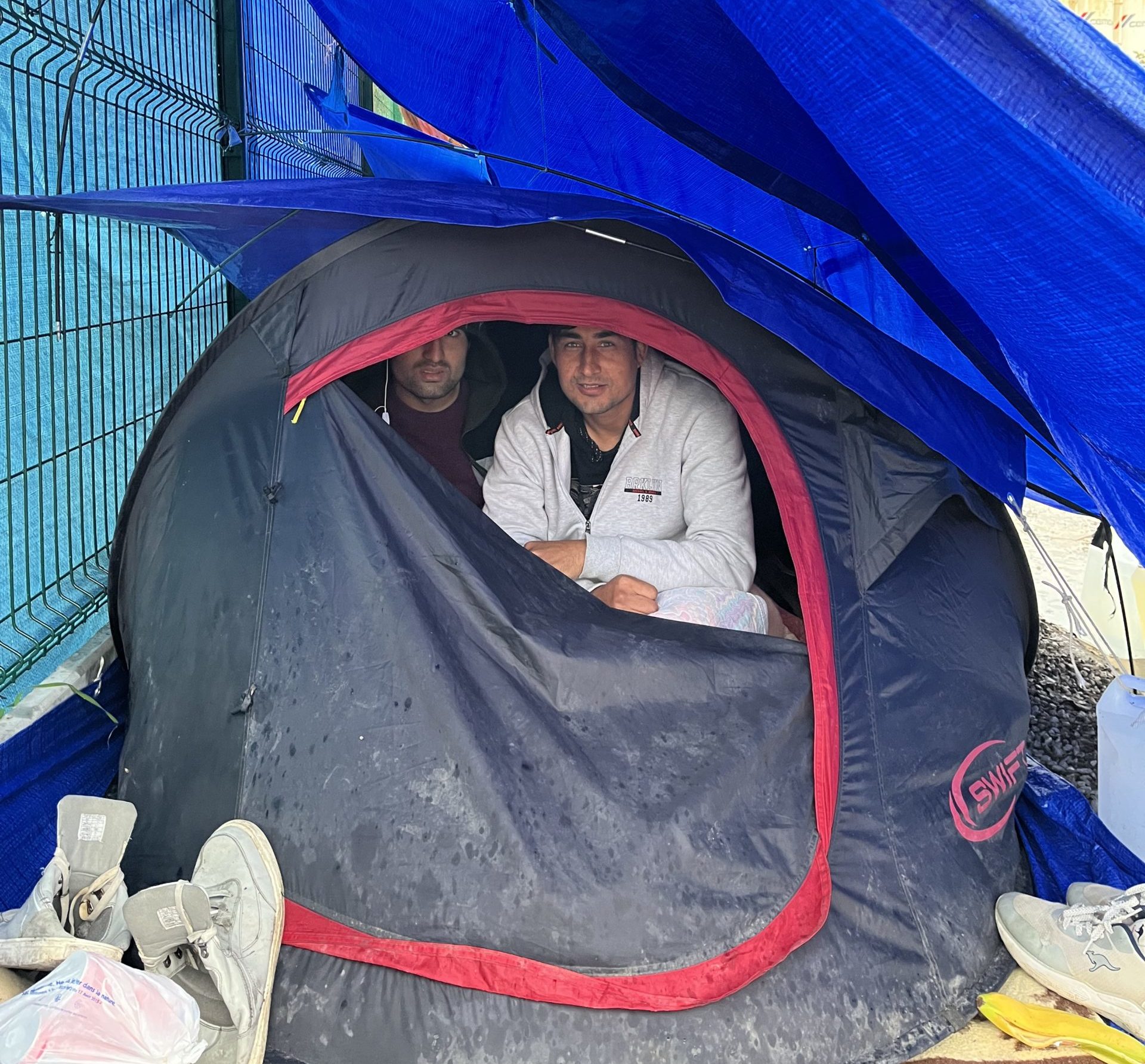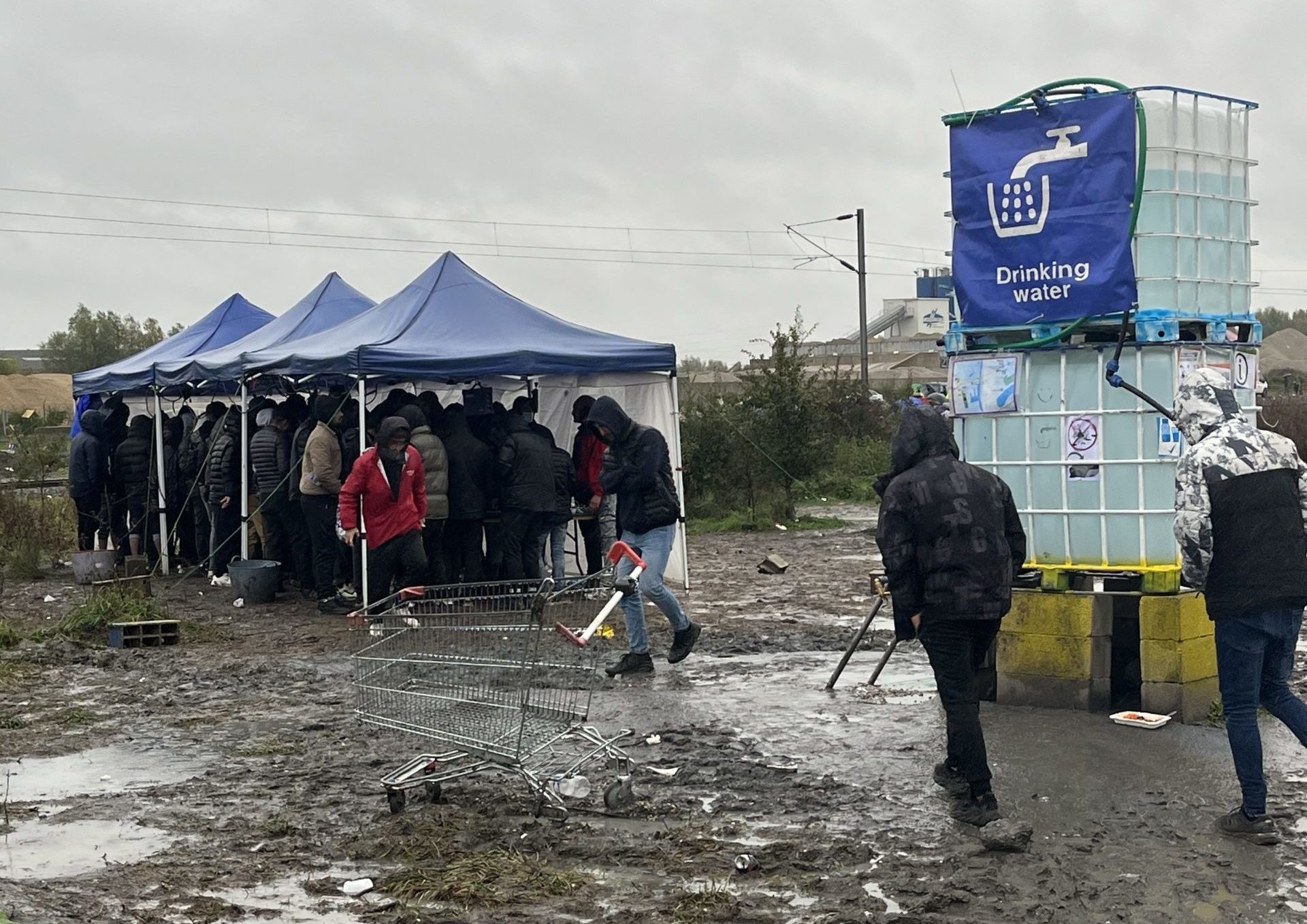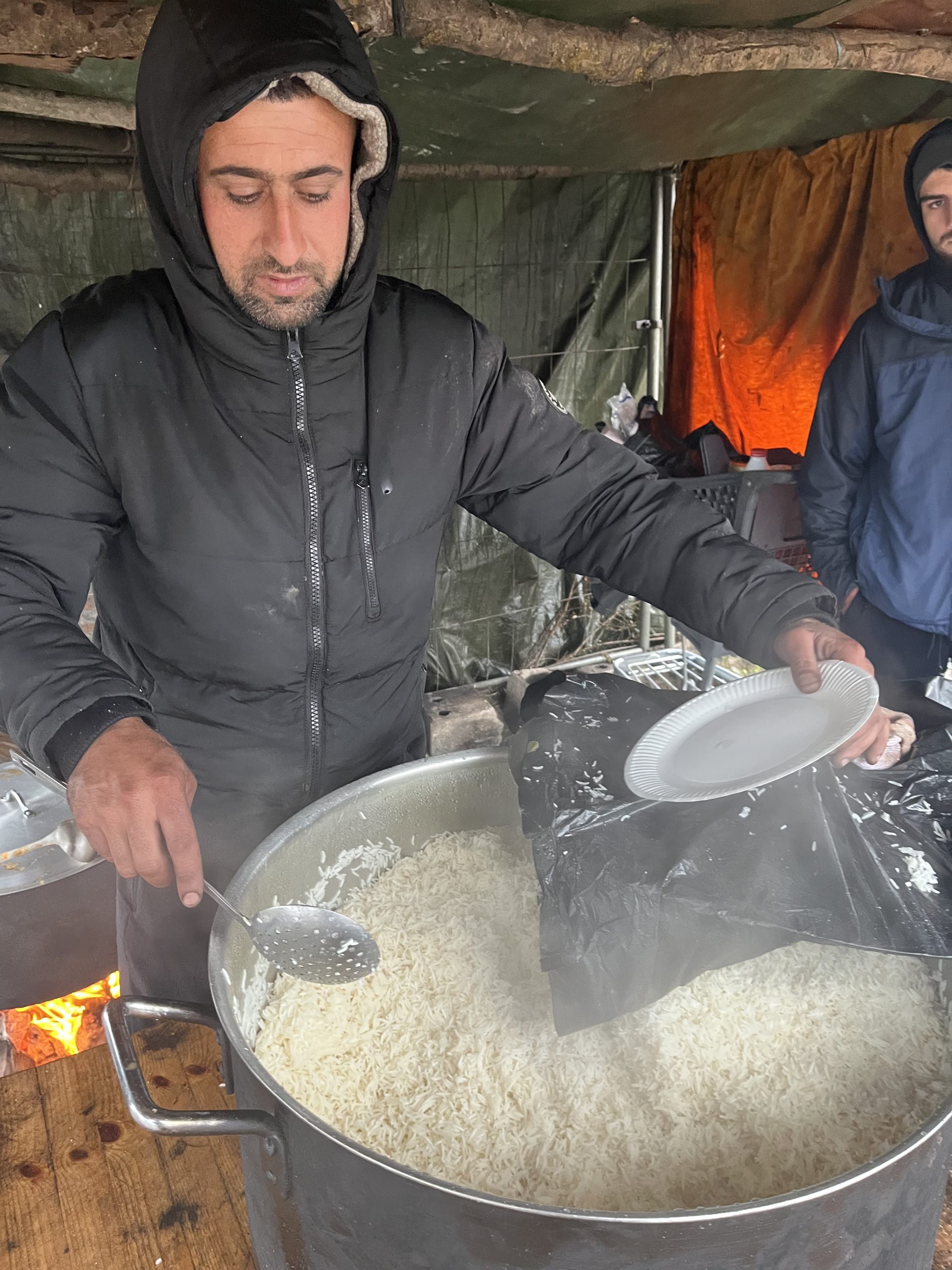Migrants leave the destroyed ‘Jungle’ camp (Christopher Furlong/Getty Images)

Everything about Calais is grey. The sky is grey, the roads are grey, the mesh fences with their tangles of razor wire are grey. Even the bottle of water I’m drinking appears, in the coastal gloom, to be grey. Calais may be the most depressing city I’ve ever been to, which, given some of the places I’ve reported from, is a high bar indeed. I wonder why Henry VIII spent so long trying to hang onto this place. Then I remember that the Field of the Cloth of Gold was held in a village only near here.
I’m here to find the hordes of marauding Albanians the Home Secretary, Suella Braverman, claims are entering the UK from France under false pretences. “Many of the arrivals this year have been from Albania, so we are working closely with the Albanian government to encourage returns and processing cases and removals as swiftly as possible,” she said over the weekend. “[They are] making spurious claims that they are ‘modern slaves’, despite paying thousands to come to this country. This abuse of our system has to stop,” she concluded.
I arrive in Calais in the late afternoon and find a strip of restaurants, all neon and twinkly and even more depressed. I need to sit down and work, and for that I need WiFi. “Désolé que nous n’ayons pas de WiFi,” I’m told when I enter the first restaurant, which seems odd, but never mind. I try next door. “We have WiFi, sir, but we have no space,” the young waiter says with a smile, extending his arms to indicate the sweep of the restaurant. I follow his gaze across rows and rows of empty tables. A burst of emotion floods my chest and face: first confusion, then a sudden gust of hot shame and, finally, rage. The urge to punch his smirking face is immediate.
I understand that he has looked at me with my scruffy, bearded, Middle Eastern appearance and decided two things: first, that I am a migrant; and second, that he does not want me in his establishment. He could have just lied and said there was no WiFi, but no. It was his casual cruelty that I found most overpowering.
I walk out into the night and look back at the restaurant’s Moroccan name, marvelling at the cognitive dissonance. The sea is a gloopy mass in the moonlight. It’s time for bed.
***
Early the next morning, I head for the Zone Marcel Doret — an industrial area in the city’s outskirts where migrants can be shoved somewhere less obtrusive. Industrial complexes loom; the skyline is a vista of gesticulating cranes. The rain is insipid.
On a side street, I stumble across a row of tents pitched up tightly on the pavement. They are the same shade of blue as those handed out by humanitarian organisations from Congo to Lesbos. Here, though, they are more canopies than full tents, extending down from the fences to which they are attached, weighed down on the road by plastic jugs filled with water.
I call into one and, after some shuffling, a smiling face pops through the open flap. The man inside is from Afghanistan. I speak to him in Persian, assuming he’ll understand at least some of it. I ask him if there are any Albanians here. He looks confused, shakes his head, and then points to a tent across the street: “Talk to them. They are Iranian in there.”

Two men of Middle Eastern appearance are walking down the street. They’re dark and scruffy — like me. I suspect they wouldn’t be served down the road either. Hasan and Mahmoud are from Egypt. They arrived two weeks ago fleeing, they claim, persecution in Cairo.
Across the road more smiling faces appear from a tent opening. “Salaam Khoobeed? Man David Hastam, Madar-am Irani-e val-e farsi-am khoob nist.” (Hi, how are you? I’m David, my mother is Iranian, but my Persian is not good.) They cluck with courteous delight at my attempts to speak their language, as Iranians always do.
One man is middle-aged, with greying hair. His friends grin shyly and give me an incongruous thumbs up from beside him in the tent. Mehdi is from Tehran and claims he is fleeing the Mullahs. Life, he explains, was no longer bearable under the oppressive regime. Like everyone else here, he and his friends are hoping to get to the UK. What does he think of Calais? “Khoob nist.” (“Not good.”)
As I leave, Hasan calls out to me. “Can you help?” When I first started my career, I would have said that by talking to me he was publicising his cause, which might help bring about political change. But I’ve been doing this long enough to know; I know it probably won’t make any difference, and I refuse to patronise him with a lie. Instead, I hand him my Diet Coke and give him €10. I also give him my email and tell him to contact me if he makes it to England.
I drive back to the city centre in silence. In the middle of a square by the water I see a huge white marquee with a red rim. Yellow lights flicker in the gloom. I get out of the car and walk towards the entrance. “Calais Ville,” reads a small banner. A tattooed man is squatting on his haunches by the entrance, smoking. He sees me and stands up.
I ask what it is. “A circus,” he says with pride. With animals? “No,” he replies with a smile, “it’s a grand human spectacle.” A streamer flag flutters limply in the wind. I feel like weeping.
***
When the so-called Calais jungle was demolished in October 2016, more than 8,000 people lived there. Today, the locals tell me that Calais has “only” 3,000 migrants. Now, if you want to visit a big camp, you need to go 40km up the road to Dunkirk.
Jules is a Calais native, and doesn’t hold back as we drive to Dunkirk. As far as he is concerned, the migrants need to leave for the UK as soon as possible. To start with, they overwhelmingly speak English (French, he explains, is much harder to learn); and second, you need fewer papers to live and work in the UK.
He tells me how tough it is for the migrants to get to the UK. “It‘s almost impossible for them to get through the Eurotunnel because of all the border controls — and without papers, forget it,” he says. This is, of course, where the people smugglers — or the passeurs, as they call them here — come in. They lurk in almost all the city squares between Berck Sur Mer and Calais. What they charge varies, he says, but it can be up to €15,000.
Each night, the French police sweep the squares in their helicopters. The passeurs send lookouts to monitor the police’s activity; when the officers leave, senior gang members descend to find new customers. He continues. “Most of the migrants are not political refugees like they claim; they are here to work.”
We pull up to the Dunkirk jungle. The early morning drizzle has morphed into a downpour and to my right I see a small, sodden hell. A tent village floats on a brown mass of sludge. Near the entrance, a sign saying “Drinking Water” has been pinned to what appears to be a tower of large, stacked crates. Around the perimeter slouch several tents, all of which appear to have differing functions. To my left, people are lining up in one to receive essentials from what appears to be an NGO. Nearby are various men sitting among crates of plastic water bottles — clearly another drinking station. To my right, volunteers are unloading goods from the boot of a car to a group of waiting Ethiopians.

I make my way over to a canteen tent. Steel pots of tea whistle; a colossal vat, which I know from my travels in the Middle East can only contain rice, bubbles with bovine contentment. Here, I meet Ali, and his two friends. They are Kurds who made the trip from Erbil. They arrived two weeks ago and have been in the camp ever since.
“I want to go to England to work,” says Ali. “Back home there is no money.” I ask him how he intends to get across with no papers and he becomes coy. “We will try,” he replies. We both know what he means — an illegal crossing. He insists I have some rice and Kurdish soup. I thank him in Kurdish (“Spas”), which brings a smile to all three men. Amid their protests I tuck €20 under the vat.
I then meet my first Albanian. Michi is a fit-looking man in his mid-20s from a village near Tirana, and he has been in Dunkirk for only a few days. Michi explains he will speak candidly if I give him a pseudonym and take no photos. He tells me that many people from home are being encouraged to make the journey to the UK for the chance of a better “economic future”. What this actually means is to work in the drug trade. “Everyone knows what to do when they get here,” he tells me. “We know that there will be people here to meet us and to tell us how to get to the UK.” Michi knows that his fellow countrymen control large parts of the hard drugs trade in Britain, and there will always be work for young men like himself.
As an Albanian, Michi can enter the EU for up to three months without a visa. Then it’s just a matter of getting to Britain, either by calling a number that does the rounds among the Albanian diaspora in Dunkirk and Calais or by turning up at one of the places in Dunkirk that, again, everyone knows. “I’ll cross soon,” he tells me. “It will cost a lot, but hopefully in the type of ‘business’ I’ll be working in I can make it back quickly,” he says with a slight laugh.

That laugh stays with me as Jules and I drive back to Calais. As the child of migrants, my sympathy for most of these people is inescapable. When I met Mehdi, I could not help but think about how my own family once made the journey from Iran to Europe. But it was on a plane and not an illegal fishing boat, and they ended up not in a tent by the side of the road but in a house they bought in North London. There was no justice to that — it was just plain luck.
Back in the country that welcomed them in the mid-Seventies, Braverman is a laughing stock: she is crass and insensitive and politically obtuse. She warned of a looming “invasion”. What I saw in Calais was many things, but it was not an invasion; it was stilted, wretched human flow.
But she is not wrong when she says Albanians are coming over — often illegally and under false pretences — to engage in criminal activity.
Then there is the wider picture. Immigration has unquestionably benefited Britain — economically and culturally and socially. But numbers, increasingly from non-EU countries, are huge and growing. This is dangerous — not just for the political impulses it spurs, but also for the fear it unleashes. This is exactly what Braverman is trying to tap into with her clumsy rhetoric.
In Britain, her incompetence manifests as chaos: in Dover, where migrant centres have been firebombed; in London, where migrants have been dumped alone in the streets; and in Westminster, where the Government shows no sign of solving this crisis. Out here in France, however, the chaos is different. It’s more subdued, but it’s there. The migrants keep arriving, often totally legally; and they keep crossing to Britain, often totally illegally. The French try to stop them, but know they cannot. The people smugglers have won.
Outside Calais, painted onto a small building, is mural of a sea monster with “Bienvenue à Calais” scrawled next to it. “It’s a mural welcoming visitors to our lovely city,” he says with a sigh.









